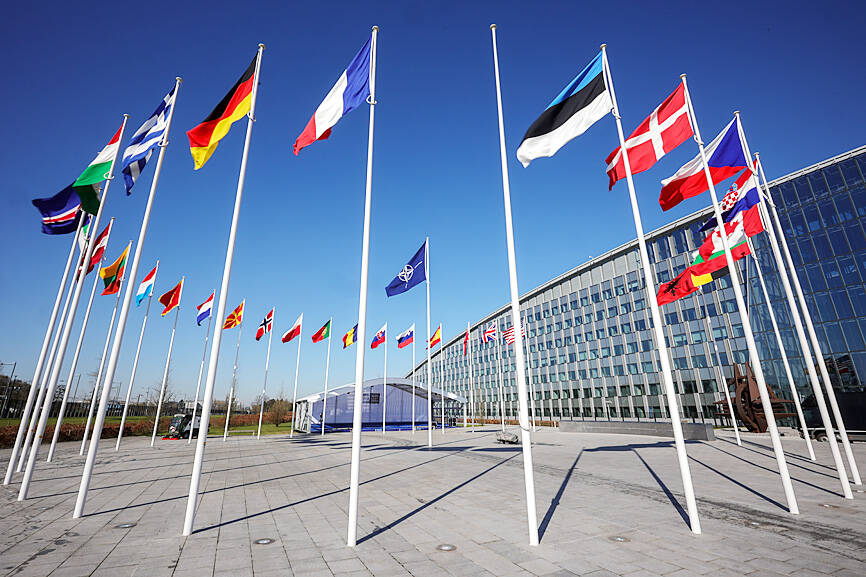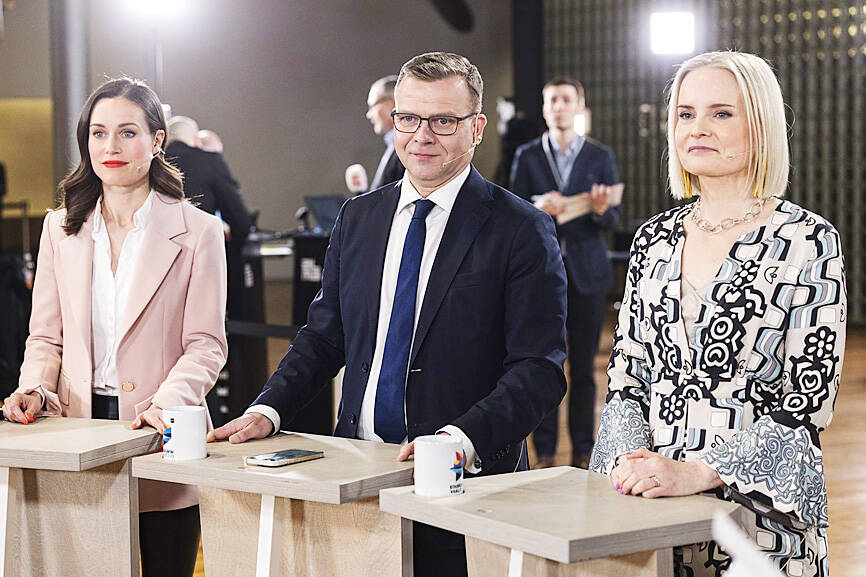Finland is to become the 31st member of the world’s biggest military alliance today, NATO Secretary-General Jens Stoltenberg said yesterday, adding that he hoped Sweden could join in coming months.
“This is a historic week,” Stoltenberg told reporters on the eve of a meeting of NATO foreign ministers in Brussels. “From tomorrow, Finland will be a full member of the alliance.”
The former Norwegian prime minister said that this afternoon, “we will raise the Finnish flag for the first time here at the NATO headquarters. It will be a good day for Finland’s security, for Nordic security and for NATO as a whole.”

Photo: EPA-EFE
Stoltenberg said that Turkey, the last country to have ratified Finland’s membership, would hand its official texts to US Secretary of State Antony Blinken today.
Stoltenberg said he would then invite Finland to do the same.
“It is a historic moment for us. For Finland, the most important objective at the meeting will be to emphasize NATO’s support to Ukraine as Russia continues its illegal aggression,” Finnish Minister of Foreign Affairs Pekka Haavisto said in a statement. “We seek to promote stability and security throughout the Euro-Atlantic region.”

Photo: Bloomberg
The development comes as Finnish voters gave a boost to conservative parties in Sunday’s election, depriving Finnish Prime Minister Sanna Marin of another term.
Marin won popularity for her Cabinet’s handling of the COVID-19 pandemic and for the nation’s strong support for Ukraine following Russia’s full-scale invasion last year. However, the election was largely fought over economic issues, with voters in the nation of 5.5 million people shifting their allegiances significantly to parties on the political right, as they seek solutions to rising state debt, inflation and other economic problems.
The bloated debt will pose a challenge for the new government, particularly since NATO membership requires Finland to increase its defense spending.
The center-right National Coalition Party won 20.8 percent of the vote, putting it in a position to try to form a government. The right-wing populist party The Finns won 20.1 percent and Marin’s Social Democrats 19.9 percent.
Juhana Aunesluoma, a professor of political history at the University of Helsinki, said that about one-third of the votes went to left-wing parties and two-thirds to parties on the right.
It was “a big swing from left to right,” Aunesluoma said in an interview.
The winning party in Finland traditionally starts government formation talks, and the National Coalition, led by Petteri Orpo — a 53-year-old former finance minister — is expected to begin negotiations next week with the goal of putting together a Cabinet enjoying a majority in the 200-seat parliament, the Eduskunta.
Orpo said late on Sunday that he intends to negotiate with all parties “to find the best possible majority government for Finland.”
If Orpo, the most likely candidate to be the next prime minister, ends up choosing the Social Democrats as a coalition partner, that could mean Marin could theoretically get a post — albeit not the prime minister’s job — in the next government.
Still, for now, a coalition with other conservatives appears to be the most likely outcome.
Finnish media touted the The Finns, which ran on an anti-immigration and anti-EU agenda, as the biggest winner of the election. The populists scored the best result of their history under the leadership of Riikka Purra, who took over the party in 2021.

The combined effect of the monsoon, the outer rim of Typhoon Fengshen and a low-pressure system is expected to bring significant rainfall this week to various parts of the nation, the Central Weather Administration (CWA) said. The heaviest rain is expected to occur today and tomorrow, with torrential rain expected in Keelung’s north coast, Yilan and the mountainous regions of Taipei and New Taipei City, the CWA said. Rivers could rise rapidly, and residents should stay away from riverbanks and avoid going to the mountains or engaging in water activities, it said. Scattered showers are expected today in central and

COOPERATION: Taiwan is aligning closely with US strategic objectives on various matters, including China’s rare earths restrictions, the Ministry of Foreign Affairs said Taiwan could deal with China’s tightened export controls on rare earth metals by turning to “urban mining,” a researcher said yesterday. Rare earth metals, which are used in semiconductors and other electronic components, could be recovered from industrial or electronic waste to reduce reliance on imports, National Cheng Kung University Department of Resources Engineering professor Lee Cheng-han (李政翰) said. Despite their name, rare earth elements are not actually rare — their abundance in the Earth’s crust is relatively high, but they are dispersed, making extraction and refining energy-intensive and environmentally damaging, he said, adding that many countries have opted to

FORCED LABOR: A US court listed three Taiwanese and nine firms based in Taiwan in its indictment, with eight of the companies registered at the same address Nine companies registered in Taiwan, as well as three Taiwanese, on Tuesday were named by the US Department of the Treasury’s Office of Foreign Assets Control (OFAC) as Specially Designated Nationals (SDNs) as a result of a US federal court indictment. The indictment unsealed at the federal court in Brooklyn, New York, said that Chen Zhi (陳志), a dual Cambodian-British national, is being indicted for fraud conspiracy, money laundering and overseeing Prince Holding Group’s forced-labor scam camps in Cambodia. At its peak, the company allegedly made US$30 million per day, court documents showed. The US government has seized Chen’s noncustodial wallet, which contains

SUPPLY CHAIN: Taiwan’s advantages in the drone industry include rapid production capacity that is independent of Chinese-made parts, the economic ministry said The Executive Yuan yesterday approved plans to invest NT$44.2 billion (US$1.44 billion) into domestic production of uncrewed aerial vehicles over the next six years, bringing Taiwan’s output value to more than NT$40 billion by 2030 and making the nation Asia’s democratic hub for the drone supply chain. The proposed budget has NT$33.8 billion in new allocations and NT$10.43 billion in existing funds, the Ministry of Economic Affairs said. Under the new development program, the public sector would purchase nearly 100,000 drones, of which 50,898 would be for civil and government use, while 48,750 would be for national defense, it said. The Ministry of